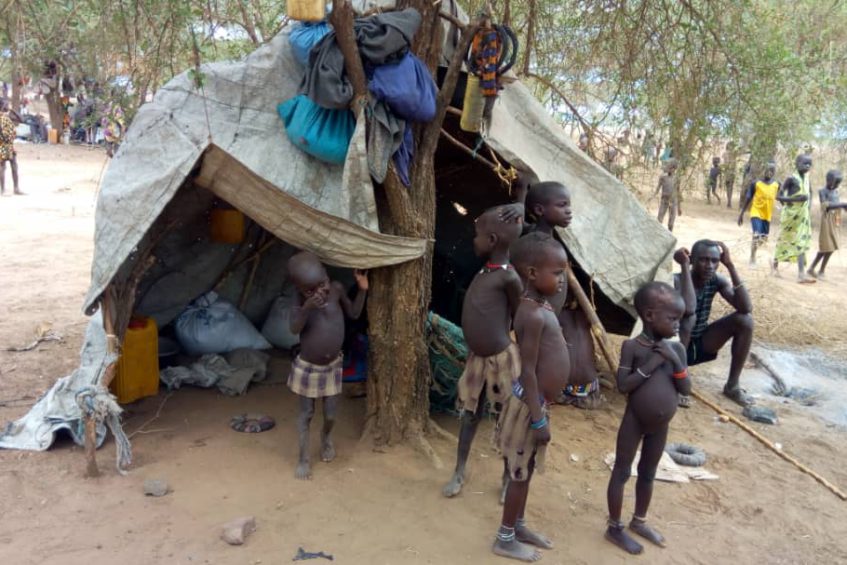You are here: Home | Featured | Humanitarian | National News | News | Eastern Equatoria official appeals for food in ‘starving’ Jie area

A make-shift shelter in the area/Courtesy photo/Peter Lokale
An official in Eastern Equatoria State has appealed for urgent delivery of food aid to the Jie area where people are said to be facing acute food shortages.
“The rain was too much and the community was not able to harvest their crops, causing hunger,” said Peter Lokale, the newly appointed deputy chairperson of the Eastern Equatoria Anti-corruption Commission.
The Jie community inhabits two payams of Lopeak and Kessengor of Kapoeta East County. The two payams have an estimated population of about 40,000 people.
Many of them are said to be surviving on wild fruits as their cereal harvests have already been depleted.
“Definitely they are now feeding on wild fruits. They are also going fishing because there is some water body there but now the fish has gotten finished,” Mr. Lokale revealed.
According to Mr. Lokale, the remote area located 89 kilometers away from Kapoeta town and 148 kilometers from Narus town is cut off, making it inaccessible to traders.
He says there is no market and no humanitarian organization in the area.
Mr. Lokale says the cattle that would have helped the community during disasters were also raided by a neighboring community last year.
“They are farmers and cattle keepers but recently there was a disaster there. All their cattle were raided and now everything is done. They were relying on cattle but they have nothing now,” he quipped.
Aid agencies say the Greater Kapoeta area inhabited by mostly pastoralist communities is historically food insecure as many rely on cattle for food and income.
On Thursday, the International Committee of the Red Cross –ICRC warned that South Sudanese are facing life-threatening food shortages following last year’s drop in harvests.
It said in its latest assessment that communities in nine out of 10 states harvested on average 50 percent less cereal and vegetables in 2020 compared to 2019.
The ICRC said tens of thousands of families, especially in Jonglei, Upper Nile, Warrap, Unity and Lakes States, are struggling for survival without an adequate harvest from 2020 and following the loss of other food reserves to conflict, armed violence and floods.
The government of South Sudan largely relies on aid agencies to address its disasters and hunger crises.
Support Eye Radio, the first independent radio broadcaster of news, information & entertainment in South Sudan.
Make a monthly or a one off contribution.
Copyright 2024. All rights reserved. Eye Radio is a product of Eye Media Limited.